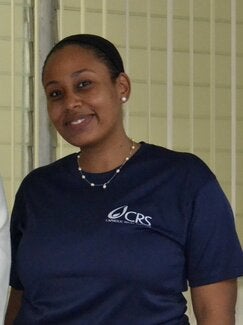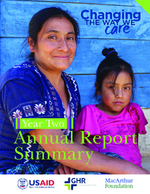
Background Information
Frederique - Master in Public Health (MPH), Doctor of Public Health candidate (DrPH)
I have always done work that has involved supporting vulnerable children and families. I started as a technical adviser on an OVC program, with a focus on family capacity building and household economic empowerment. After that, I worked with a team of child protection professionals to support the Haitian government, local government and civil society organizations to prevent, recognize and respond to child and youth trafficking and protect the victims.
Organizations:
- Catholic Relief Services
- Arthur Ashe Institute for Urban Health
- Brooklyn Health Disparities Center
Our Interview With Practitioner
I intentionally try to learn on the job from my colleagues who are social workers with years of experience working in child protection. I also participate in learning opportunities online or through Changing the Way We Care and it is useful engaging with other partners. I learn a lot from going to the field as well.
The first is that parents and caregivers, in most cases, do believe that they are doing the best for their children when they take the difficult decision to place them in a residential care facility. What we are finding is that, with a bit of support and encouragement, families are able to see that having the child at home with them is the most secure place that child can be. The second is that this work is a constant process of having to learn, identify challenges, process, and adapt and move forward. For example, orphanage directors often misunderstand the work that we are trying to promote. They are adamant that their institutions are welcoming to children and that institutional care is the best way – they feel that they are supporting families. We are learning that we need to continue to try to motivate and influence them – and this still needs more work if we are going to be able to make any change at scale.
The two tools that I have found most useful are the two that we are using for parenting and savings and loans. I have learned from them myself and also found that they have delivered positive results with families. Our parenting program is an adapted version of the Parenting for Lifelong Health program – it is called KAP pou Lavni and was adapted for use in Haiti. The other tool is the SILC methodology for savings and loans groups that is used by CRS.
What really motivates me is the fact that we have a child-centered approach and that we are also working with the family - it is important to do these together. I also get motivated by the fact that in our work in resource-poor communities, we are all learning together. Once we have started working together, families and communities that began by saying that they are poor start to identify existing strengths and resources within their own communities that they did not know of before. I also enjoy seeing how families that have participated in the program are now recognizing that they are able to save and build up with their own resources once they begin to participate in savings and loans groups (SILC). We are not coming in and adding funds - the savings and growth that they make are with their own means. Families are proud that they were able to do this by and for themselves.
Definitely economic strengthening! And this includes financial education. Providing the financial education and then supporting them to apply that financial knowledge with savings and loans is really beneficial. Families have thanked us for helping them unlock this skill, that they didn’t know they had before the course. There is a Kreyòl saying (and apologies to those that are vegetarian and prefer not to eat pork) - “se grès kochon an ki kwit kochon an". That means the pig gets cooked in its own oil - that is, using what is already there to get the result.
Where They Operate
Key Areas of Work
Languages Spoken
Practitioner Resources
The Returning to Original Vision case story demonstrates reunification of children with disabilities as a critical step in transition. It also highlights the challenges of maintaining organizational vision within a process of transforming services.
Launched on October 1, 2018, the CTWWC initiative is organized around three main strategic objectives: (1) Governments promote family care; (2) Children stay in or return to safe and nurturing families; and (3) Key stakeholders make meaningful commitments toward family care. The second year of the initiative is summarized in this report of progress.


